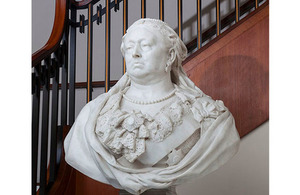Rare bust of Queen Victoria by master sculptor at risk of leaving the UK
Arts minister steps in to prevent unique piece from export

Arts Minister John Glen has placed a temporary export bar on an extraordinary sculpture of Queen Victoria to provide an opportunity to keep it in the country.
The sculpture is at risk of being exported from the UK unless a buyer can be found to match the asking price of £1.2 million.
This remarkable depiction of the ageing monarch was created by master sculptor Alfred Gilbert, who transformed British sculpture in the late nineteenth and early twentieth centuries.
His celebrated works include the Shaftesbury Memorial (better known as Eros) at Piccadilly Circus in London, and a magnificent tomb to Prince Edward, Duke of Clarence, in St George’s Chapel, Windsor.
The sculpture was based on a full-length bronze statue of Queen Victoria, which Gilbert had produced in 1887. Gilbert rarely worked in marble; most of his sculptures are of bronze, making this piece even more exceptional.
Arts Minister John Glen said:
This captivating likeness of Queen Victoria showcases the extraordinary skills of celebrated sculptor Alfred Gilbert.
I would be delighted to see this unique piece on display in a UK institution where the public can enjoy and admire it.
The sculpture depicts Queen Victoria towards the end of her long life. The marble has been sensitively carved to reflect the texture of her skin and her meditative expression, as well as the soft swirls of cloth around her head and shoulders.
While the bust has the appearance of a highly realistic likeness, the sculptor did not work from life but from photographs, using his own mother as a model for the figure and drapery. He said at the time, “One was Queen of my country – the other Queen of my heart”.
The bust was commissioned in 1887 by the Army and Navy Club to celebrate the golden jubilee of Queen Victoria’s coronation in 1837, as well as their own jubilee – the Club having been founded in 1837.
The decision to defer the export licence follows a recommendation by the Reviewing Committee on the Export of Works of Art and Objects of Cultural Interest (RCEWA), administered by The Arts Council.
RCEWA member Lowell Libson said:
Sir Alfred Gilbert, a leading but mercurial light in the British ‘New Sculpture’ movement, is now regarded as one of the greatest European sculptors of the period.
This monumental portrait bust of the Queen-Empress is not only an important icon made at the apogee of British power but a complex and hugely sympathetic image. It is also a tour de force of marble carving, a medium which Gilbert rarely employed.
The RCEWA made its recommendation on the grounds of the sculpture’s outstanding significance to the study of the work of Alfred Gilbert, the leading British sculptor of his generation. They also praised Gilbert’s imperious but compellingly naturalistic portrayal of the monarch.
The decision on the export licence application for the sculpture will be deferred until 7 December 2017. This may be extended until 7 April 2018 if a serious intention to raise funds to purchase it is made at the recommended price of £1,200,000 (plus VAT of £240,000).
Offers from public bodies for less than the recommended price through the private treaty sale arrangements, where appropriate, may also be considered by John Glen. Such purchases frequently offer substantial financial benefit to a public institution wishing to acquire the item.
Organisations or individuals interested in purchasing the sculpture should contact the RCEWA on 0845 300 6200.
A photo of the sculpture can be downloaded via our flickr site.
ENDS
For media information contact: Yasmin Kaye Communications Officer Department for Culture Media and Sport Tel: 0207 211 6489 Email: yasmin.kaye@culture.gov.uk
Notes to editors
- Details of the sculpture are as follows: A white marble bust portrait (h. 96 cm) of Queen Victoria, executed by Alfred Gilbert (1854-1934) from 1887 to 1889.
- The Reviewing Committee on the Export of Works of Art and Objects of Cultural Interest is an independent body, serviced by The Arts Council, which advises the Secretary of State for Culture, Media and Sport on whether a cultural object, intended for export, is of national importance under specified criteria.
- The Arts Council champions, develops and invests in artistic and cultural experiences that enrich people’s lives. It supports a range of activities across the arts, museums and libraries – from theatre to digital art, reading to dance, music to literature, and crafts to collections. www.artscouncil.org.uk.